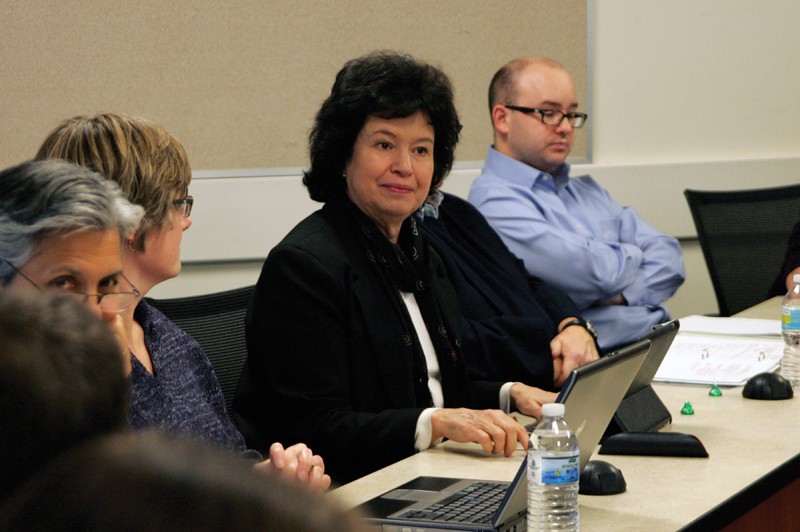UAS plans for busy year

GVL / Amy Hammond Provost Gayle Davis speaking at the UAS meeting.
Sep 4, 2013
The University Academic Senate of Grand Valley State University is looking to run things a little differently this year by encouraging input from the student body and increasing communication among the campus community.
Karen Gipson, professor of physics at GVSU, is the new chair of UAS. She said she sees a gap in the
amount of student concerns that are relayed back to the people who are making the decisions for
their school.
“I don’t know that the students feel their voice is heard,” Gipson said, “I’m taking that very seriously
this year.”
Communication
Gipson explained that her goal is to have better communications about what is important to
students, staff and faculty. While the Student Senate speaks for the student voice, and there are
committees for faculty and the different areas of the administration, UAS is responsible for hearing
all of those concerns and issues and taking action.
In an attempt to build better communication, Gipson and Tonya Parker, vice chair and professor in
the movement science department, met each of the colleges’ deans and committee chairs over the
summer to hear new ideas and thoughts on areas the university could improve on.
UAS also invites students to speak to the members of the Executive Committee to the Senate (ECS) that represents their academic college.
Teacher
Evaluations
One of the first items UAS expects to discuss at tomorrow’s meeting has to do with faculty evaluation.
For years, students have been given the same teacher evaluation form at the end of the semester –
the instructor leaves the room and students fill out the paper that may or may not have much to do
with the way that class was taught. UAS has realized that this may not be the best way to finding
out how effective the teachers and courses actually are for students.
“It’s long overdue,” Gipson said. “It’s all over the map. Different colleges use different forms. Then
there is the burden on students to evaluate every course, every semester, every teacher. It’s time to
change.”
Throughout the next few UAS meetings, senate members will discuss the details of the changes and
listen to student input in an attempt to make a universal way to evaluate courses and teachers. One
option being considered is to move them entirely online to Blackboard, or use an outside system
for evaluations such as OrgSync.
Incomplete Grades
Students who receive an incomplete grade for a class aren’t able to graduate with an incomplete
grade on their transcript. This rule has posed many problems for students who forget to settle the
letter grade before their final semester.
“By the time they get around to it, the instructor may have left, or they are far enough along in their
program (and) it would be silly to go back,” Gipson said. “Even if all we do is set up an automatic
reminder a year before they are expected to graduate. We just want to clean up the process.”
Often times, students are forced to postpone graduation because they run into problems of classes
being full or having too many incompletes and not enough room in their schedules to resolve them.
The senate will be discussing this topic throughout the year and hopes to resolve the issue soon.
The 10 committees of the senate spoke up about the issue, according to Gipson, almost
universally.
Online courses, fall break and more
Following a discussion from last year, introducing a Fall Break for students will be another factor
for the senate to consider. While much buzz about this topic has been felt around campus, senate
is still discussing a resolution to it.
A few other topics UAS will begin to discuss after tomorrow’s meeting include class sizes, whether
to continue a credit/no credit base for study abroad and the use of online courses.
“Where does this fit? Is it something right for us?” Gipson asked about the creation of online
courses, or even entire programs. “The time is right to have strategic vision online.”
One main challenge of the senate is trying to find ways to improve the education at GVSU without
interfering with tuition. Gipson explained that while they don’t always receive enough funding,
tapping into student tuition more is not something they are willing to do.
“We’re just focusing on being a better university, whatever ‘better’ means,” Gipson said, “We don’t
get a lot of money from the state. We have to consider how to best use our resources to do all this
without being a burden on students and their tuition.”
To see a list of senate members and the academic colleges they represent, visit
www.gvsu.edu/facultygov.

























